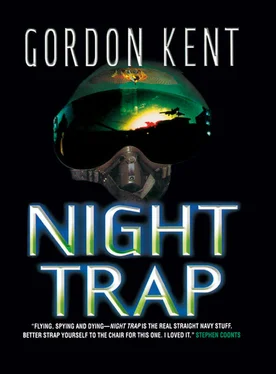“Can’t you do it?” Carl’s voice was soft and pleading, almost feminine. “Sheldon, I need you to do it. Only this once.”
Bonner started to whine again. “I’d have to find out which plane he’s gonna fly, and that can be tricky; then I gotta get at the plane, but I gotta nick the gun that inserts the codes and reset it. It’s too much!”
“Twenty-five thousand dollars.”
“I’m not a saboteur! I’m a—a—” He shrank into himself. “Specialist.”
“I need you to do this for me, Sheldon. For both of us. The Iranians will be charmed to shoot down the CO of an attack squadron. They will love us! We will have years and years with them, Shel.”
“I need more money.”
Carl frowned. “I might get you thirty-five. I can try. I promise I will try.”
“That’s it? Tops?”
Carl nodded.
Actually, thirty-five was more than he’d dared think about. He owed about fifteen. Still, it would be a horrible effort. His gut would be a mess until it was over. He continued to object. “You’d have to get the frequency to me. So I’d know what to set in the plane. I’d try to give you the target. The timing’s all wrong.”
“I’ll have a frequency for you when you put into Mombasa. Then you should know the rest by the time you reach Bahrain.”
“What if we make the hit before we get to Bahrain?”
“We’ll take that chance. These people understand that such a thing is not easy. They have a good idea what the potential targets are, anyway.”
“I oughta get my money either way.”
“That is understood. I think there will be a bonus for a confirmed kill. Yes, I think it is a very good idea, this one. They will be able to test their system and the Navy will have no idea it has happened. Then, the next time—” He fluttered his fingers in the air like disintegrating aircraft.
Bonner felt sweat trickling down his ribs. “I’ll be shitting bricks until it’s over,” he said.
“Yes, but when it’s over, think how good you’ll feel. Money, Sheldon!”
They spent some time talking over the details, and the longer they talked, the more familiar it seemed to Bonner, therefore the more workable. This was a trick he would have to play on himself, making it familiar, so that after a few days he would not come to with a start and remember that he was going to do this thing, feeling his colon lurch. Actually, even now, once he got a little used to it and the chill of fear had passed, he liked the planning, and he liked sitting here with this important man, who had been a big gun in Moscow and now was going to be a big gun in Tehran. He liked being wanted. And he liked the money.
“How is your son?” Carl said when they were done.
“Good. He writes, like, once a month.”
“He is still in the satellite communications school?”
“Yeah. Four months, he comes out, he’s an E5, one bump down from his old man.”
“Tehran are very interested in him. They are mad for communications technology. You will speak to him?”
“The time isn’t right. When it’s right, I will.”
“Maybe, the slow approach, Sheldon—little by little—”
“Don’t tell me how to handle my own son! I’ll do it. In my time! He’ll come around. I gotta put it to him just right—father and son, doing it together. He’s very idealistic. He doesn’t know I do this, I’ve told you that. I’ll bring him around, but—Just don’t tell me how to handle my own son.”
“Well—Of course. It is a wise father who knows his child—eh?”
They walked up the hill to the car. Carl told him a taxi was waiting for him around the next curve.
They did not touch. Carl put on sunglasses, as if he were withdrawing his personality. “You must bring your son in, Sheldon. It will be worth— lots of money. Eh?”
The car pulled away, and Bonner was left feeling suddenly isolated on that sunny stretch of road, with the city close by but somehow unreal, as if it was unpopulated, as if he was the only man on earth. He had no idea how close he had come to dying.
He walked up the hill, sweating again, and found the taxi. On the back seat was a bottle of Jack Daniel’s.
Bonner went back to his hotel and turned on the television and began to drink. It was only early afternoon, but he was content to sit there, watching the bright colors, hearing the language he did not understand, a man more comfortable with his loneliness than with any other companion the teeming city could offer.
He began to plan how he would turn his son into a spy.
Ouspenskaya slipped into the Director’s office after a single knock. The receptionist was gone, the building quiet except for the duty crews on the second floor, and here and there some manager like the Director plugging away. He knew she was coming.
“Well? What is urgent?” His cold was worse.
“Efremov.”
“Yes?”
She sat down. Her hands were trembling. She was truly wretched, for something monstrous had obtruded into this place, this idea she had of Moscow and being Russian, as if an obscene animal had dragged its slime across her foot. “Five days ago, a gang attacked an office in the Stitkin Building here in Moscow. Twenty-nine dead.”
“I remember.” He guessed at once; his voice showed it.
“The office was Efremov’s latest front operation. Venux, Inc. To run the four agents I told you of.”
“Oh, my God.” He was breathing through his mouth like an adenoidal child, looking absurd and feeling dreadful. “My God,” he said again as he saw it all. “They wiped out the entire operation.”
She nodded. “A hired job. Ex-military all over it.”
“Maybe it’s a fake—”
She shook her head. “What do you think, the Army did it? No, no! It’s just what we’re doing to ourselves! Efremov disappears; somebody wipes out his best operation—every clerk, every computer operator; they burned the place out—files, disks, shredder, everything! We’re already four days late; the police treated it as ordinary crime—‘ordinary,’ ah!—and our people didn’t go in until I sent them an hour ago. There’s already been looting of what’s left. What kind of people are we becoming? ”
“You think—the father of the girlfriend? Mafia?”
“I don’t know. For what? Revenge?” She shrugged. “I’m having Papa Malenkov brought in. No pussy-footing. I’ve told them to rough him up and see what he says. Let him know we’re not the Moscow police.” She shook her head. “But it doesn’t add up. If it’s a message to us, why hit a disguised operation that we don’t know about? If it’s a message to Efremov, where is he? Is he dead? Then what’s the point?” She wiped her cheeks, sank back. What she was suffering was grief, grief for a lost ideal. “Maybe he’s dead. But maybe he isn’t . And if he isn’t—”
“If he isn’t—Maybe he did it. Eh? You say this operation was new—a few months. Nine? Nine. So—maybe, that long ago, he was planning—something?”
“It seems far-fetched. But Efremov could be very cute if he wanted to. He liked to cover his tracks, even long before—mmm—current conditions.”
The Director made a face. “Say it. Long before perestroika . My God! The good old days.” He made a sound, something between a laugh and a groan. “My God, Ouspenskaya, what a ball of shit it’s all turned into! Any idea where Efremov would go?”
“None.”
“Out of the country?”
“I suppose.”
“You’ve checked the various agencies that—of course you have. All right, he was clever, he was an old campaigner, he could have gone over any border he wanted. I’m only brainstorming, mind you—improvising; I’m sure he’s dead, in fact. But let’s say, for argument’s sake, he isn’t. Presumably he had money abroad. Well. So, he destroys the organization that handles his best agents. To deny us? Of course, a nice joke, one ‘in your eye,’ as they say. He never liked me, I might say. You, I always thought he had his eye on. No? Well, there you are. I’m a bureaucrat, not a human relations specialist. Presumably he plans to take himself to somebody else, with his star agents as his salesman’s samples—eh? So he destroys everything and everybody who can track those agents. Well, that makes a grisly kind of sense. So who does he go to? The Americans? Not likely; he really despised the Americans. Notice I talk of him in the past tense, as if he were dead.” He made the laughing groan again, trying to break through her mood. Failing, he said, “ Please , Ouspenskaya!” He came around the desk, stood in front of her, patted her shoulder. He only made things worse: she began to weep. The Director poured a glass of water from his carafe (made in Sweden) and held it out to her.
Читать дальше












